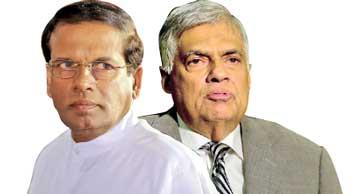Reply To:
Name - Reply Comment
Last Updated : 2024-04-20 00:00:00
 By Yohan Perera and Ajith Siriwardana
By Yohan Perera and Ajith Siriwardana
The Presidential Commission of Inquiry (PCoI) that investigated into the Easter Sunday’s attacks in 2019 has recommended the Attorney General to consider instituting criminal proceedings against former President Maithripala Sirisena and several others while found fault with former Prime Minister Ranil Wickremesinghe, but recommended no action against him.
A copy of the report, which was handed over to the Speaker, by the Presidential Secretariat stated that “The COI noted that President Sirisena proceeded to India and then to Singapore from 16 to 21 April, 2019 without making any acting appointment for the post of Minister of Defence in spite of the knowledge of a possible threat from IS/Zaharan. No doubts, in terms of the Constitution, there appeared on the discretion of the President in making of an acting appointment. Nevertheless, in the given circumstances, President Sirisena should have made an acting appointment.”
“Based on the evidence, the COI is of the view that there is criminal liability on his part for the acts or omissions explained above. The COI recommends that the Attorney General consider instituting criminal proceedings against President Sirisena under any suitable provision of the Penal Code.”
The report also recommended to institute criminal proceedings against former IGP Pujith Jayasundra and the then Defence Secretary Hemasiri Fernando, Senior DIG Nandana Munasinghe and Director SIS- Nilantha Jayawardena.
It has also recommended to investigate allegations of bribery and corruption against former Minister Rishad Bathiudeen.
“Based on the overall assessment of the evidence before us, it is our view that the IGP failed to act in view of the vast amount of intelligence reports that provided him the background, development and the conduct of Zaharan that brings in an element of criminal liability. He has failed to take effective and decisive action as the IGP of the country.”
“Based on the evidence, the COI is of the view that there is criminal liability on his part for the acts or omissions explained above,” the report stated.
Although the COI found fault with former Prime Minister Ranil Wickremesinghe, no action has been recommended against him.
“After the constitutional crisis in October 2018, Prime Minister Wickremesinghe did not take part in National Security Council (NSC) meetings. However, even after his appointment as Prime Minister in December, 2018, he was not invited by President Sirisena for any NSC meetings. The COI sees no justifiable reason for the failure to do so on the part of President Sirisena. However, it was incumbent on the Prime Minister to have raised this issue in Parliament or at the Cabinet in order to ensure that the status quo is restored. The failure on the part of Prime Minister Wickremesinghe to do so and after the Easter attack, take up the position, that he was not invited is unacceptable.”
“Upon a consideration of the evidence, it is the view of the COI that lax approach of Mr. Wickremesinghe towards Islam extremism as the Prime Minister was one of the primary reasons for the failure on the part of then Government to prevent the Easter Sunday terror attacks.”
“In view of the analysis made in Chapter 13, COI is of the view that Nilantha Jayawardena, Director SIS, did not attach the weight he should have attached to it which is also reflected in the communication he sent to IGP on 9, April, 2019. In particular, had diluted the weight of the intelligence provided by the Indian Intelligence.”
“Senior DIG Nandana Munasinghe who possessed the knowledge of terrorist activities and Islamic terrorism, failed to fully appreciate the information of an impending attack provided to him.”
“The COI concludes on the available evidence that the primary causes for the events of 21, April, 2019 are the Wahhabis ideology and groups such as the Thowheed groups, SLJI and SLISM. Internationally the activities of the IS and locally the activities of extremist groups such as BBS contributed to the events.”
“The COI identifies on the available evidence that Zaharan, Rilwan, Shaini, Ilham, Inshaf, Jameel, Hasthun, Muath, Azad, Mubarak, Naufer, Milhan, Sadeeq and others as persons who are directly connected with the terrorist acts referred to in the Mandate. The profiles of some of them are at Chapter 16. Organisations such as the SLJI, SLJIM and Thowheed groups are indirectly connected in as much as Thowheed (Wahhabis) ideology is the foundation upon which Islam extremism operates.” the report stated.

Add comment
Comments will be edited (grammar, spelling and slang) and authorized at the discretion of Daily Mirror online. The website also has the right not to publish selected comments.
Reply To:
Name - Reply Comment
On March 26, a couple arriving from Thailand was arrested with 88 live animal
According to villagers from Naula-Moragolla out of 105 families 80 can afford
Is the situation in Sri Lanka so grim that locals harbour hope that they coul
A recent post on social media revealed that three purple-faced langurs near t